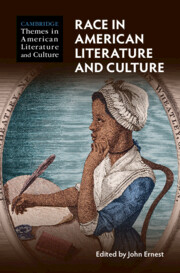Book contents
- Race in American Literature and Culture
- Cambridge Themes in American Literature and Culture
- Race in American Literature and Culture
- Copyright page
- Contents
- Contributors
- Acknowledgments
- Introduction
- Part I Fractured Foundations
- Part II Racial Citizenship
- Part III Contending Forces
- Part IV Reconfigurations
- Part V Envisioning Race
- Part VI Case Studies
- Part VII Reflections and Prospects
- Index
Introduction
Published online by Cambridge University Press: 26 May 2022
- Race in American Literature and Culture
- Cambridge Themes in American Literature and Culture
- Race in American Literature and Culture
- Copyright page
- Contents
- Contributors
- Acknowledgments
- Introduction
- Part I Fractured Foundations
- Part II Racial Citizenship
- Part III Contending Forces
- Part IV Reconfigurations
- Part V Envisioning Race
- Part VI Case Studies
- Part VII Reflections and Prospects
- Index
Summary
Race is central to American history. It is, or should be, impossible to understand the United States without attending carefully to how race has been defined and deployed at every stage of the nation’s history. From the 1790 Naturalization Act, which limited naturalization to “free white persons,” to the Trump presidency, race has been at the center of American cultural life – both shaping and shaped by economic practices and priorities; influencing where people live and what opportunities they are likely to encounter; serving as a key variable in local, state, and national elections; serving as the ominous subtext of the legal system and policing methods; and guiding government policies and social practices. Although our educational system has almost miraculously managed to isolate and contain much of US racial history into discrete and settled textbook chapters, it is difficult to imagine American history without accounting for the effects of the system of slavery, Indian removal, the Dred Scott decision, the Indian Appropriations Act, the Chinese Exclusion Act, Japanese incarceration, or other racist projects in American history that shaped how the system works – who has control over space, governance, and power. Every aspect of American culture, from the Electoral College to the history of sports and entertainment, has been almost immeasurably influenced by the determination of the white population to define and guard the borders of whiteness and to subordinate and control all those beyond those borders.
- Type
- Chapter
- Information
- Race in American Literature and Culture , pp. 1 - 8Publisher: Cambridge University PressPrint publication year: 2022

